Metal Detecting Laws UK For 2025: A Guide to the Best Practices

Written by Piotr Lesniewski
Detectorist • Scotland
As an Amazon Associate we earn commission from qualifying purchases. Read our full Affiliate Disclosure.
The United Kingdom has a robust and multifaceted approach to heritage protection. This system aims to record and preserve important archaeological and historical sites and objects for the benefit of all.
Metal detecting activities, by their very nature, interact directly with this buried heritage, and are therefore subject to a range of metal detecting laws in 2025.
Key Takeaways
- Always obtain explicit permission from landowners before detecting on private or public land.
- Report any find believed to be “Treasure” to the relevant authorities within 14 days.
- Metal detecting on Scheduled Monuments and protected sites without consent is a criminal offence.
- All finds of historical or archaeological importance should be reported to the Portable Antiquities Scheme (PAS).
- Respect the NCMD Code of Conduct: leave no trace, avoid damaging sites, and follow ethical detecting practices.
Key Metal Detecting Laws UK-Wide for 2025
Several key pieces of legislation govern metal detecting across the United Kingdom. While some laws apply broadly, there are crucial differences in how finds are treated, particularly between Scotland and the rest of the UK.
Understanding these foundational laws is the first step for any aspiring detectorist.
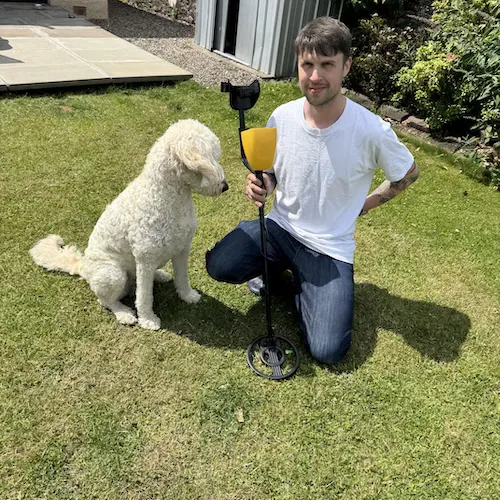
The Treasure Act 1996 (England, Wales & Northern Ireland)
The Treasure Act 1996 is a cornerstone of heritage law in England, Wales, and Northern Ireland, replacing the older common law of Treasure Trove. It defines what constitutes “Treasure” and outlines the legal obligations of finders.
It is important to note that the Treasure Act 1996 is up to date with changes known by May 2025, but metal detectorists should always remain vigilant for any future amendments.
What is “Treasure”? Understanding the 2025 Definition
The definition of Treasure has evolved, and it is vital for detectorists to be aware of the current criteria. As of 2025, objects are generally defined as Treasure if they meet one of the following conditions:
Any metallic object (other than a coin) that is at least 300 years old when found and has a precious metal content (gold or silver) of at least 10% by weight.
Any group of two or more metallic objects of any composition that are of prehistoric date and found in the same place.
Two or more coins from the same find that are at least 300 years old when found. If the coins contain less than 10% gold or silver, there must be at least ten of them to qualify.
Objects that would have been treasure trove before the 1996 Act but do not fall into the above categories. This typically refers to objects substantially of gold or silver, deliberately hidden with the intention of recovery, and whose owner or heirs are unknown.
A crucial update, effective from 30th July 2023 and therefore highly relevant for 2025, significantly broadened this definition. The Treasure Designation (Amendment) Order 2023 introduced a new class of Treasure: any metallic object or coin that is more than 200 years old and is found by a Coroner to have met the definition of “significance“.
This “significance” criterion means that items of lesser material value, or younger items (over 200 years rather than 300), can now be declared Treasure if they are deemed to be of outstanding historical, archaeological, or cultural importance.
This shift towards cultural and historical importance, beyond purely material or age-based criteria, requires finders to be even more discerning. It underscores the growing recognition that objects do not need to be made of precious metal to hold immense heritage value, potentially leading to more diverse finds being acquired for public collections.
The Secretary of State also retains the power to alter the definition of treasure by order.
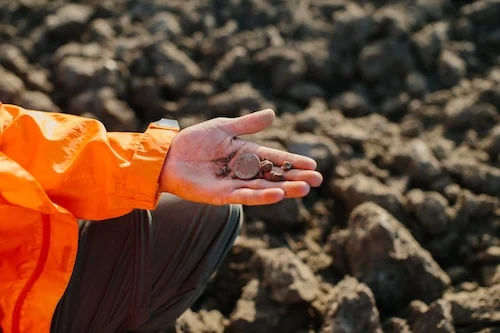
Your Legal Duties as a Finder (England, Wales & NI)
If a metal detectorist finds an object they believe might be Treasure, there is a strict legal duty to report it to the local Coroner for the district in which the object was found.
This report must be made within 14 days of making the find, or within 14 days of realising that the find might be Treasure. Failure to report suspected Treasure is a criminal offence.
In England and Wales, finders are strongly encouraged to contact their local Finds Liaison Officer (FLO), who is part of the Portable Antiquities Scheme (PAS), for assistance with identification and navigating the reporting process. The FLO can help prepare the report for the Coroner. Landowners and occupiers of the land where Treasure is found have a right to be informed of the find and are also eligible for a share of any reward if the item is acquired by a museum.
In Northern Ireland, the process is similar. Finds believed to be Treasure must be reported within 14 days to National Museums NI (who will then notify the Coroner).
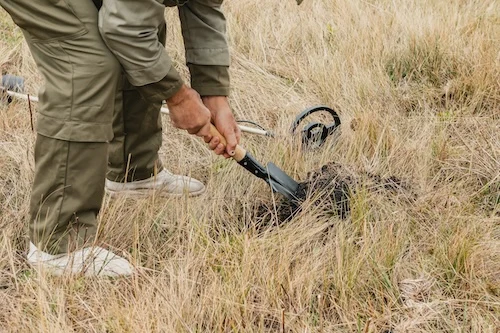
The Treasure Trove System (Scotland)
Scotland operates under a different legal system for found antiquities, rooted in the common law principle of bona vacantia (ownerless goods).
This means that any portable antiquity of archaeological, historical, or cultural significance found in Scotland, regardless of its material (it does not have to be gold or silver), can be claimed by the Crown. It is an offence not to declare such a find.
All archaeological finds in Scotland should be reported to the Treasure Trove Unit (TTU), which is based at National Museums Scotland but operates independently. The TTU assesses all reported finds. If the Crown, via the TTU, decides to claim an item, it is then considered by the Scottish Archaeological Finds Allocation Panel (SAFAP). SAFAP, an independent body, determines which accredited Scottish museum will be allocated the find and also sets the level of any ex gratia award to be paid to the finder.
This system is notably broader than the Treasure Act, requiring detectorists in Scotland to report a wider array of objects. An independent Review of Treasure Trove in Scotland was launched in September 2023, with its report anticipated by Autumn 2024. Recommendations from this review are expected to influence policy and practice from 2025 onwards.
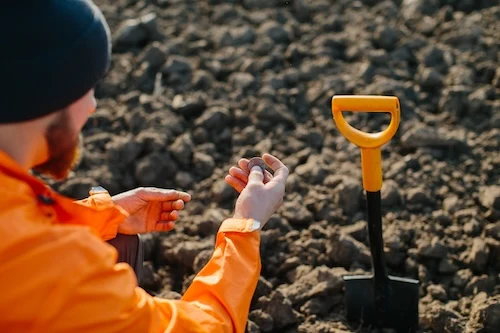
The Ancient Monuments and Archaeological Areas Act 1979
This Act is fundamental to the protection of the UK’s most important archaeological sites, known as Scheduled Monuments (SMs). It makes it a criminal offence to use a metal detector on a Scheduled Monument, or to remove any object from one, without official written consent from the relevant national heritage body.
The distinct systems for dealing with finds in E/W/NI versus Scotland highlight a fundamental divergence in legal approaches to heritage within the UK. A metal detectorist moving between these jurisdictions must be acutely aware of these differing obligations.
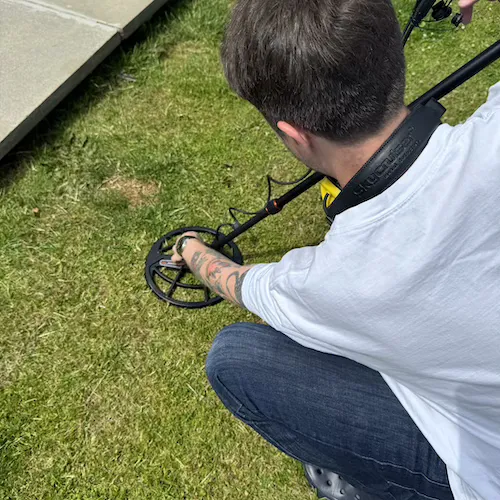
Where Can I Legally Metal Detect in the UK? Permissions and Prohibitions
Navigating the rules of land access is one of the most critical aspects of lawful metal detecting. The overarching principle is that permission is almost always required.
Unless a specific permissive right exists (and these are limited), metal detectorists should assume they cannot detect on a piece of land until they have confirmed they can and have secured the necessary authorisations. This “default to no” mindset is crucial for beginners to avoid inadvertent trespass or breaches of local regulations.
The Cardinal Rule: Landowner Permission is (Almost Always) Essential
The most fundamental rule for metal detecting in the UK is that explicit permission from the landowner must be obtained before detecting on any land.
This applies to all private land, including farmland, woodland, and even some areas that might appear to be public. If the land is farmed by a tenant, permission from both the landowner and the tenant is necessary. Detecting without such permission constitutes trespass, which is a civil offence, and if items are removed, it can lead to criminal charges of theft.
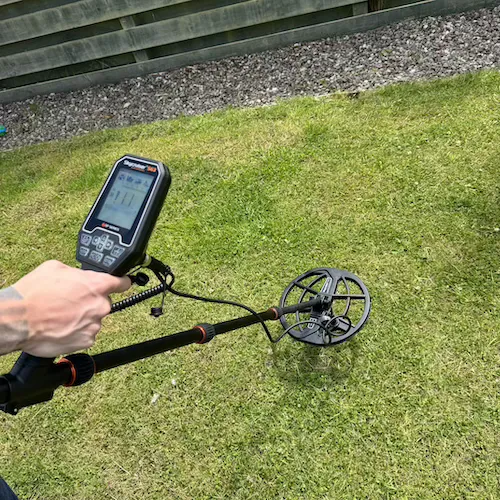
Private Land (farmland, woodland, etc.)
To seek permission, detectorists can make local enquiries or consult the Land Registry for England and Wales or ScotLIS for Scotland to identify landowners. It is highly advisable to get any permission in writing. The National Council for Metal Detecting (NCMD) provides a template “Search Agreement Form”. Such an agreement should ideally cover access arrangements, the specific areas where detecting is permitted, and how any finds will be divided.
Council Land (public parks, some beaches, other council-managed areas)
Permission is usually required for detecting on land owned or managed by local councils. Rules can vary significantly from one council to another, so it is essential to check the specific byelaws and policies of the relevant council before detecting. Some councils may operate permit schemes, while others may have outright bans.
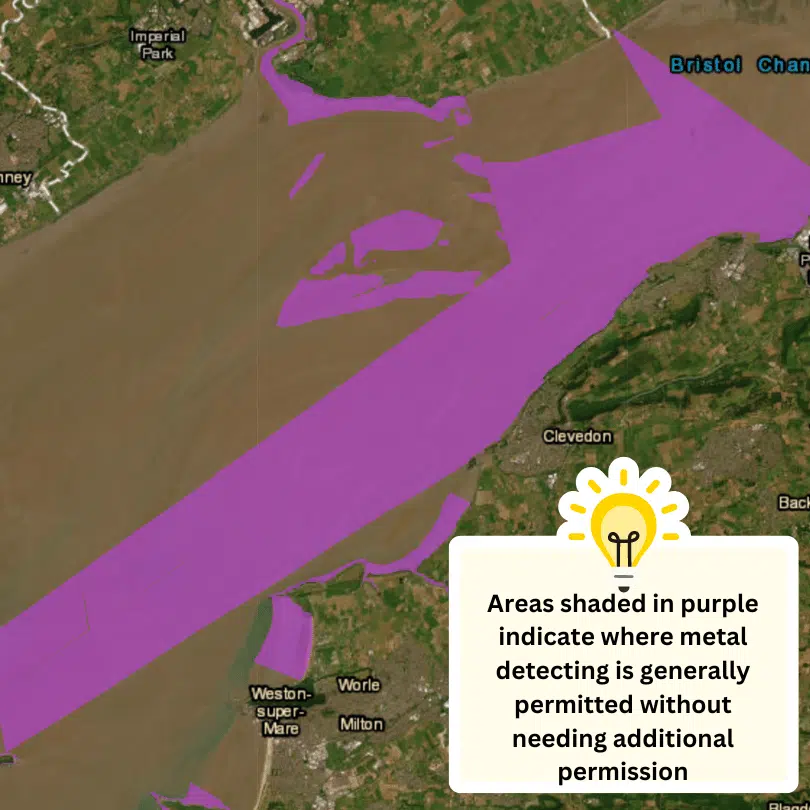
Only Crown Estate Beaches Legally Allow Metal Detecting
Beaches are a common destination for metal detectorists, but the rules vary depending on ownership and location:
Crown Estate Foreshore (England, Wales, NI)
The Crown Estate generally grants “permissive permission” for metal detecting on the foreshore (the area between the mean high and low water marks). A specific permit is not usually required, but detectorists must adhere to The Crown Estate’s terms and conditions. This permissive right explicitly does not apply to the seabed below the low water mark, riverbeds, or any other type of Crown Estate land.
Crown Estate Scotland Foreshore
Crown Estate Scotland, which manages a significant portion of Scotland’s foreshore, generally does not require prior permission for metal detecting on the foreshore land it manages.
The Thames Foreshore (Teddington to Thames Barrier)
Unique rules apply to the tidal Thames foreshore. Anyone wishing to search this area must hold a current foreshore permit issued by the Port of London Authority (PLA). Due to very high demand, the waiting list for these permits is often suspended.
Privately-owned and Council-managed beaches
For any beach not part of the Crown Estate foreshore, explicit permission from the private landowner is essential. If a beach is managed by a local council, their specific byelaws and permission requirements must be followed.
National Trust Beaches
The National Trust has a near-complete ban on metal detecting on its properties, including beaches, unless it forms part of a formally approved archaeological project.
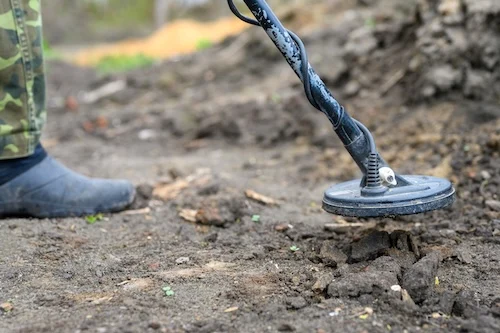
Forestry Land: Policies of Forestry England, Forestry and Land Scotland, Natural Resources Wales, and Forest Service NI
Policies regarding metal detecting on land managed by the UK’s main forestry bodies are generally restrictive:
Forestry England: Hobbyist metal detecting is generally prohibited.
Forestry and Land Scotland: Informal or hobby metal detecting and gold panning are not allowed.
Natural Resources Wales (NRW): Metal detecting is listed as an activity for which individuals must check if they are allowed. This points towards a generally restrictive policy.
Forest Service Northern Ireland: The licensing requirement from the Historic Environment Division (HED) would heavily restrict or effectively prohibit hobbyist metal detecting.
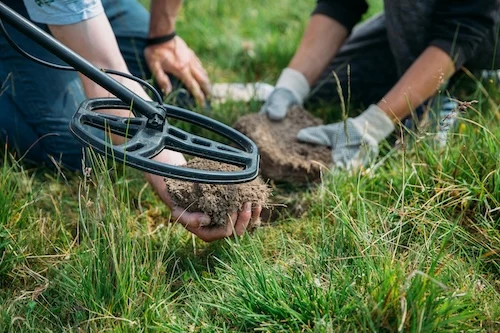
Quick Guide to Permissions for Common Land Types (UK 2025)
Private Agricultural/Woodland Land: Landowner (and tenant if applicable) permission is ESSENTIAL. A written agreement is highly recommended.
Council Parks & Open Spaces: Check Local Council Byelaws. Permission/Permit is often required and varies significantly.
Crown Estate Foreshore (England, Wales, NI): A permissive right is granted, but you must adhere to strict Terms & Conditions (e.g., hand tools, no deep digging).
Crown Estate Scotland Foreshore: A permissive right is generally granted for foreshore they manage.
Thames Foreshore (Teddington to Barrier): A Port of London Authority (PLA) Permit is ESSENTIAL. The waiting list is often closed.
National Trust Land (incl. beaches): Generally PROHIBITED for hobby detecting.
Forestry England Land: Generally PROHIBITED for hobby detecting.
Forestry and Land Scotland Land: Informal/hobby detecting is NOT ALLOWED.
Natural Resources Wales Woodland: Likely RESTRICTED/PROHIBITED. Direct inquiry is essential.
Forest Service NI Land (DAERA): Likely RESTRICTED/PROHIBITED due to NI law requiring a licence for any ground disturbance for archaeological searches.
Scheduled Monuments (All UK): STRICTLY PROHIBITED without official consent from the relevant heritage body.
SSSIs/ASSIs (All UK): Generally RESTRICTED/PROHIBITED. Consent from the relevant nature conservation body is usually required.
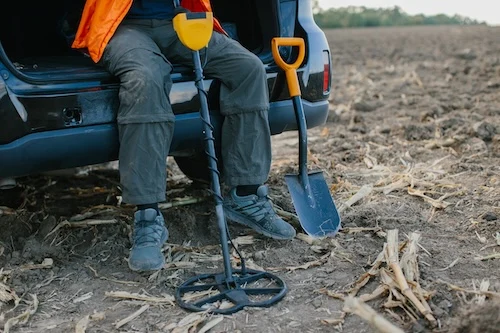
Strictly Off-Limits: Understanding Protected Sites
Beyond general land access rules, specific categories of land are afforded stringent legal protection. Metal detecting on these sites is almost always prohibited or subject to exceptionally strict consenting processes.
Scheduled Monuments (SMs): The Highest Level of Protection
The general rule is that metal detecting on a Scheduled Monument is strictly prohibited without prior official written consent from the relevant national heritage body. Using a metal detector or removing any object from an SM without this consent is a criminal offence carrying severe penalties.
England: Section 42 Consent is required from Historic England.
Wales: Section 60 consent is required from Cadw.
Scotland: Metal and Mineral Detecting Consent (MMDC) is required from Historic Environment Scotland (HES).
Northern Ireland: Consent is required from DfC HED.
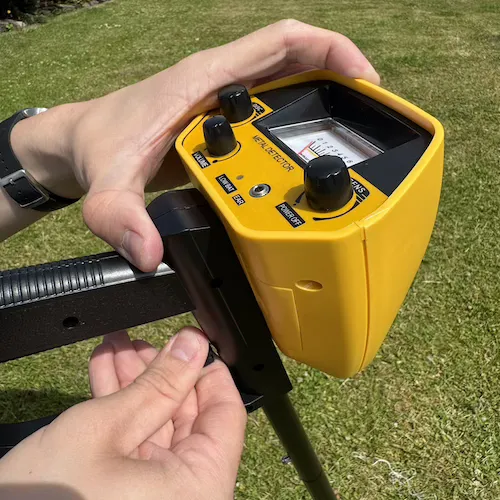
Sites of Special Scientific Interest (SSSIs) / Areas of Special Scientific Interest (ASSIs)
The general rule is that metal detecting on SSSIs/ASSIs is restricted or prohibited, as it can cause damage or disturbance. Consent from the relevant national statutory nature conservation body is usually required. It is crucial to understand that landowner permission alone is insufficient and does not override the legal protections afforded to SSSIs/ASSIs.
Land Managed by the National Trust, Historic Houses, and Similar Bodies
The National Trust has a near-complete ban on metal detecting on all its properties. The only exception is for formally approved and supervised archaeological projects. Other similar bodies are also likely to have highly restrictive policies.
Other Restricted Areas
Ministry of Defence (MoD) property: Illegal without specific permission.
Land under agri-environment schemes: Often includes clauses that restrict or regulate detecting.
Church land (glebe land): Permission from relevant church authorities is usually required.
Access Land: May have restrictions on activities like metal detecting.
Key Regulatory Legal Bodies for Protected Sites by UK Nation
England: Historic England (for Scheduled Monuments) and Natural England (for SSSIs).
Wales: Cadw (for Scheduled Monuments) and Natural Resources Wales (NRW) (for SSSIs).
Scotland: Historic Environment Scotland (HES) (for Scheduled Monuments) and NatureScot (for SSSIs).
Northern Ireland: Department for Communities – Historic Environment Division (DfC HED) (for Scheduled Monuments) and Northern Ireland Environment Agency (NIEA) (for ASSIs).
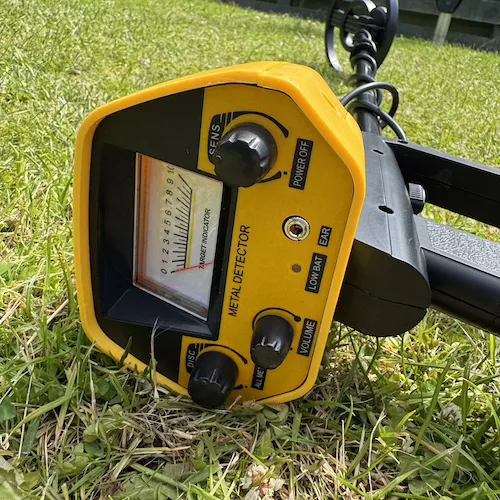
You’ve Found Something! Reporting Your Metal Detecting Finds Legally in 2025
Discovering an object is only part of the process; responsible metal detecting involves understanding and fulfilling your legal and ethical obligations to report finds.
Reporting Potential Treasure
England, Wales & Northern Ireland
There is a legal obligation to report any find believed to be Treasure to the local Coroner within 14 days of discovery. In England and Wales, your local Finds Liaison Officer (FLO) is the primary point of contact for help. In Northern Ireland, you should report potential Treasure directly to National Museums NI.
Scotland
The system is different. All such finds must be reported to the Treasure Trove Unit (TTU) at National Museums Scotland. It is an offence not to declare a find.
Legal Treasure Definitions and Reporting Per UK Nation (2025)
England & Wales
Terminology: Treasure Act 1996
Definition: Objects >300 yrs, >10% gold/silver; prehistoric hoards; coin hoards >300 yrs; NEW (2023): objects >200 yrs, metallic, deemed “significant” by Coroner.
Reporting To: Coroner (usually via local Finds Liaison Officer – FLO).
Deadline: Within 14 days of find/realisation.
Northern Ireland
Terminology: Treasure Act 1996 (as applied in NI)
Definition: Similar to E&W, including the NEW (2023) "outstanding importance" clause.
Reporting To: National Museums NI, who inform the Coroner.
Deadline: Within 14 days of find/realisation.
Scotland
Terminology: Treasure Trove / Bona Vacantia
Definition: Any portable antiquity of archaeological, historical or cultural significance.
Reporting To: Treasure Trove Unit (TTU) at National Museums Scotland.
Deadline: Promptly / As soon as possible.

Reporting Non-Treasure Finds: The Portable Antiquities Scheme (PAS) in England and Wales
Even if a find does not qualify as Treasure, it may still be of archaeological or historical interest. In England and Wales, the Portable Antiquities Scheme (PAS) is a voluntary scheme that encourages the recording of such archaeological objects found by the public. Recording finds with PAS contributes valuable data that helps archaeologists and historians understand the past.
Best Practice: The Metal Detector Code Of Conduct
Beyond strict legal compliance, responsible metal detecting involves adhering to ethical codes of conduct.
Adhering to the National Council for Metal Detecting (NCMD) Code of Conduct
The NCMD Code of Conduct is the benchmark for responsible detecting. Key principles include:
Obtain Permission: Always secure permission. Do not trespass.
Leave No Mess: Reinstate all holes carefully and tidily.
Respect the Countryside Code: Leave gates as you find them, do not damage crops or disturb wildlife.
Report Finds: Follow the correct procedures for reporting Treasure and other archaeological finds.
Avoid Protected Sites: Do not use a metal detector on protected areas without official permission.
Dispose of Rubbish: Help keep Britain tidy by safely disposing of any litter you find.
Handling Sensitive Finds
Human Remains: If you believe you have found human bones, stop digging immediately. Do not disturb them. Contact the local Police and the landowner.
Live Ammunition or Lethal Objects: DO NOT TOUCH OR ATTEMPT TO MOVE THEM. Mark the location from a safe distance and immediately report the find to the local Police and the landowner.
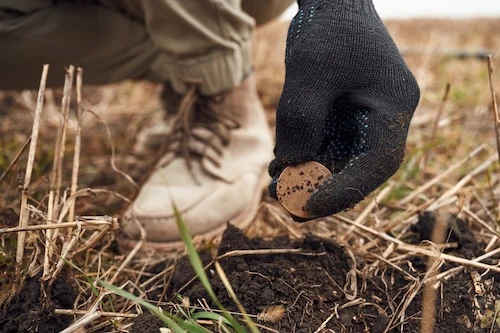
What Happens If You Metal Detect Illegally?
Failing to adhere to the laws can lead to serious consequences, from civil disputes to criminal prosecution.
Trespass: A civil matter where the landowner can take legal action.
Theft (“Nighthawking”): A criminal offence if you remove finds from land without permission.
Failure to Report Treasure: A criminal offence with penalties up to three months’ imprisonment and/or a fine of up to £5,000.
Illegal Metal Detecting on Scheduled Monuments: A very serious offence. Penalties can include unlimited fines and/or imprisonment. In Scotland, fines can be £50,000 or more.
Confiscation of Equipment: Courts can order the confiscation of metal detecting equipment used in an offence.
Enjoying Your Metal Detecting Responsibly and Legally
Metal detecting offers a unique window into the past. However, access to this heritage comes with significant responsibilities.
The legal framework is designed not to stifle the hobby but to ensure that it is conducted in a way that safeguards the UK’s finite and irreplaceable archaeological resource. A significant majority of Treasure finds are discovered by members of the metal detecting community, and the data collected by the PAS is invaluable for research.
Ultimately, the future of metal detecting in the UK depends on the actions of each individual. By embracing a proactive approach to understanding and following the law, respecting the land, and contributing finds to the archaeological record, detectorists can ensure they enjoy the thrill of discovery while playing a positive role in preserving the past.
Author Profile

Piotr Lesniewski
"Digging up the past, one signal at a time."
Polish-born, Scotland-based, and obsessed with the beep. My passion began decades ago, exploring fields with my Dziadek (grandfather). Now, with over 10 years of digging under my belt, I'm here to share everything I've learned—unfiltered and unbiased—to help you unearth your own piece of history. No sales pitches, just real field experience.